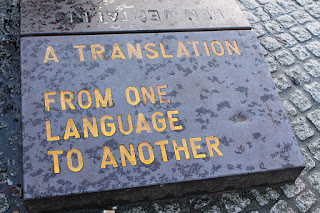Translation Could Make or Break Your International Business. Here’s Why.
How are you communicating all aspects of your business – from sales to compliance – across borders and languages? Your answer to this question is more imperative than you may think.
Companies operating in the international trade sector communicate via different languages in nearly every
facet of the business. From corresponding with manufacturers and problem-solving with export departments to marketing products overseas and cooperating with foreign authorities – multilingual communication is vital – which is why many global companies prioritize hiring bilingual or multilingual employees. And while it’s true that bilingual employees are essential for day-to-day back-end communications, there are many situations in which it is crucial to go a step further and hire professional translators to ensure your company’s success.
There are three main areas where professional translation services (or lack thereof) can make or break a company: marketing and corporate communications, operational documentation and recordkeeping, and compliance. Here’s why:
- Marketing and Corporate Communications
“Great Execution is the Ultimate Differentiator”, says Margaret Molloy, Global Chief Marketing Officer and Head of Business Development at the renowned Siegel+Gale global branding consulting firm. This marketing quote is particularly relevant to translation, because the importance of having impeccable multilingual marketing and corporate communications cannot be understated. Marketing materials need to attract customers, plain and simple. This advice holds true not only for the marketing materials you create and convey in your native language, but also for the multilingual marketing materials you distribute. If your message doesn’t resonate with your foreign market, winning enough market share to be successful will be tough indeed.
In addition to traditional marketing materials, social media marketing also needs to be perfectly executed in all languages. Nothing makes a consumer scroll by an ad or post faster than if it’s poorly written in their native language (or not written in their language at all).
Lastly, “great execution” is also essential when translating corporate communications. Investors and shareholders want to see clear and concise press releases and reporting, and to state the obvious, accuracy is key. Poor translations could be preventing you from reaching the elusive unicorn status by turning off people or companies who might have otherwise invested heavily in your company.
- Operations
Despite the fact that customers never see the mounds of operational documentation that make a global company function, it is still essential that these documents be translated correctly or written accurately in English for recordkeeping purposes. For instance, US-based importers receive a significant amount of operational
documentation from overseas, and the English in these documents can be less than stellar. This type of documentation includes, but is not limited to, invoices, packing lists, product packaging, power of attorney forms and import-specific documentation such as specific import/export declarations required for government agencies including the Animal and Plant Health Inspection Service (APHIS), the USDA (United States Department of Agriculture), the Food and Drug Administration (FDA), the Consumer Product Safety Commission (CPSC), among others. Having poorly written documentation may not cause any disruption in your normal course of business, but if a customs authority, tax authority or other corporate compliance authority ever decides to conduct an audit, meticulous and easy-to-understand documentation will provide the kind of positive first impression that could set the tone for the entire audit, which leads me to area number three:- Compliance
Undergoing an external audit of any kind is serious business. Whether it be a customs audit, tax audit, HR audit, Sarbanes-Oxley (SOX) audit or other, providing the auditing body with professionally-translated documentation from foreign subsidiaries is key to successfully managing an audit or investigation. For US customs audits in particular, customs authorities require an enormous amount of paperwork from the importer and its foreign supplier(s) relating to how and where the imported goods were manufactured, what financial and service agreements the parties have with one another, and documentation proving the company’s compliance with related-party transactions and other accounting policies, if applicable. Most of the documentation provided by foreign suppliers will likely be in another language and will need to be translated. Needless to say, a mistake in the translation of these types of documents could be catastrophic for your business and could ultimately lead to failing the audit – an embarrassing and potentially costly issue.
The Difference
Although bilingual employees are integral for day-to-day communications and operations, professional translators have extensive experience and training on how to accurately and concisely convey your messages in your unique
voice to your particular audiences. We know that different communication mediums require distinct writing styles and techniques, we know that company-specific terminology is important, so we prioritize working with customers to create company-specific glossaries to ensure term and brand consistency. Most importantly, we know how to ensure that your translations never sound awkward or stilted. Many professional translators have former careers in various industries, and we use this subject matter expertise to guarantee translation accuracy and quality.
“Great Execution” Requires Investment
Translation is an investment like any other; once you start allocating resources for this service, you will see returns, as long as you choose your provider(s) wisely. With the proper partner(s), you could boost your company’s reputation overseas, maintain more coherent records and be more prepared should you face a regulatory inquiry or audit in the future. If you’ve never provisioned for translation expenditure before, now is the time to do it.















